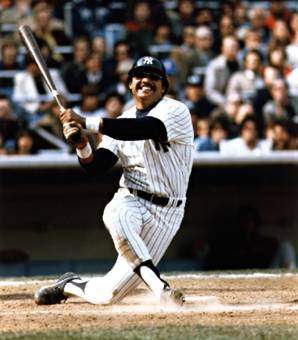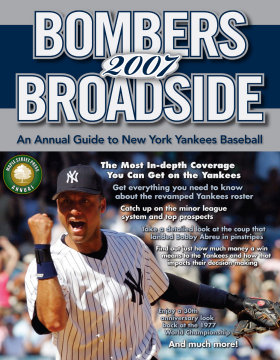Been enjoying poking my nose through my baseball library and selecting some cherce quotes, so here’s another one for ya. This one if from Foul Ball: Five Years in the American League, by Alison Gordon, who covered the Blue Jays from 1979-83. Gordon describes herself as “a socialist, feminist, hedonist with roots in the sixties, a woman who had marched against the bomb, done drugs, and never, ever even wanted to date the head jock at school, had nothing in common with these children of Ozzie and Harriet, locked in a fifties timewarp.” Some combination, huh? I enjoyed her take on Mr. October:
Undeniably a star with an extraordinary sense of the moment, Jackson was one of the most fascinating, but unpleasant, characters I encountered in baseball. It’s only a fluke I feel that way. There were some reporters I respect whom he liked and who assured me that Jackson was a sensitive and intelligent man, unfairly at the mercy of the sharks that surrounded him. It could be. I wouldn’t know because he thought I had a fin on my back, too. He was a bit like Billy Martin in that way. If you encountered either one on a good day you came away thinking he was a prince. On a bad day there were jerks. I never hit a good day with either one.
Had I not been a print reporter it would have been a different matter. Jackson loved television interviewers once the camera was turned on because this was an image he could control. He was wonderful in front of the cameras, self-effacing and God-fearing, all “Hi, Mom” and five-dollar words. Out of their range, he was completely unpredictable.
Being a reporter from the boonies didn’t help either. What importance could a reporter from Toronto have in the world of baseball, for heaven’s sake? I wasn’t Peter Gammons of the Boston Globe or Tom Boswell of the Washington Post, so why bother? I didn’t cover the Yankees or the Angels when he played for those teams. I wasn’t in the inner circle.
On the fringe, I wastched as he manipulated my colleagues, who practically tugged their forelocks in deference. He sighed at what he considered dumb questions while winking at the reporters who covered him daily, exempting them from his scorn. They ate it up. Then he would turn and snarl at the offender, asking him exactly what he meant by his question. He reduced the meek to jelly and enjoyed it. It made me ashamed of my profession to be reduced to acting a role in Jackson’ drama of the moment. The man was only a ballplayer, after all, whatever inflated importance he placed on it, and not that great a ballplayer either, day in and day out.
That these men are perceived to be more important than doctors or scientists or firemen or teachers, on the evidence of what they are paid, struck me often, but the disproportion never seemed greater than when I dealt with Jackson. Here was a supreme egotist with one skill, the ability to hit a baseball out of any park in the major leagues when the game was on the line, and for that he was deified by the fans…He exemplified none of the greater virtues of sport, team play and sportsmanship, but he was a greater hero than those who did.
And yet there was another side to him. He was kind to young players, dispensing bits of himself to star-struck rookies and making them feel at home on his turf. Once, in 1979, in Toronto, he was walked by Phil Huffman. He yelled at the young pitcher all the way to first base, accusing him of not having the guts to throw him a pitch he could hit. Huffman, cocky himself, yelled right back. A week later, in New York, in the last game Huffman would pitch in the major leagues, in his eighteenth loss of the season, Huffman struck Jackson out. When the game was over and Huffman was packing up his stuff, the clubhouse attendant walked up to him at his locker and handed him a baseball. It was inscribed “To Phil—I admire your toughness. Reggie Jackson.”
I admired the gesture, which meant a lot to Huffman, but I also saw it as an extraordinarily condescending thing to do to a player who was, after all, a fellow major leaguer, not a beseeching twelve-year-old fan. But I’m sure that baseball now holds a place of pride among Huffman’s souvenirs.
(more…)






